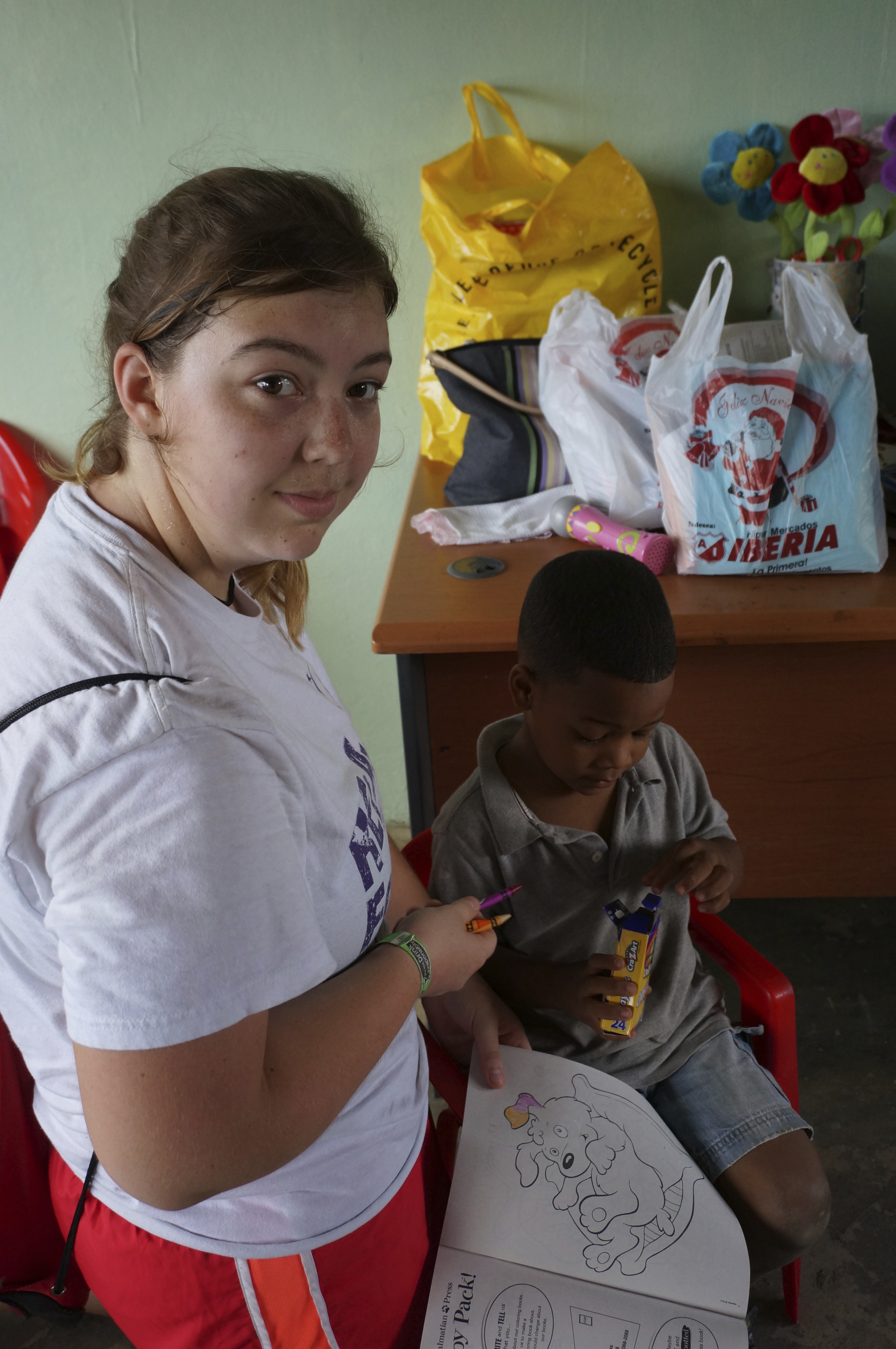Students explore faith, service, learning in international immersion experience

When asked about his experience in a recent interfaith service-learning trip to the Dominican Republic, Obaid Rehman of Clifton, Va., a freshman majoring in biological sciences in the College of Science, took a long, reflective pause. Visibly moved by the experience, he said, “I can’t put it into words.”
Instead, he offered an Islamic teaching, “The fastest way to God is through service to his creation.”
For Rehman, and 17 other students, that service involved assisting with educational projects and manual labor during a nine-day trip in January that took them to the eastern province of Hato Mayor. The trip was developed as part of Virginia Tech’s response to President Barack Obama’s Interfaith Campus Challenge, which was issued by the White House, the Department of Education, and the Corporation for National and Community Service to “build understanding between different communities and contribute to the common good.”
Coordinated by VT Engage: The Community Learning Collaborative, Hillel at Virginia Tech, the Wesley Foundation, and the Muslim Student Association, the immersion experience had two purposes. First, to learn about education and training for at-risk youth as an international social issue, and secondly, to foster inclusive, interfaith dialogue and reflection abound service and social justice.
Participants represented the Christian, Jewish, and Muslim faiths. Organizations and departments across disciplines and faiths helped to make the project a reality.
More information about the project partners is available on the trip's blog.
“We wanted them to learn about education in the context of what a privilege it is,” said Jake Grohs, associate director for student engagement. “Our goal was that they come back with questions about justice and inequity in society and that they understand service and volunteerism in a different way.”
In cooperation with the Community Service Alliance, a Dominican-based nonprofit partner of VT Engage, and the local Ministry of Education, the group spent the majority of its time on a ranch where 50 high school students were enrolled in an extraordinary enrichment program that combined baseball, leadership, and learning.
“They came to the ranch to learn community values and develop aspirations as well as train for baseball,” said Nancy Stevenson of Linwood, N.J., a sophomore studying biological systems engineering in the College of Engineering and the College of Agricultural and Life Sciences. “They were there because they wanted to be there. They were so motivated. You could see it in their eyes.”
Many of the Dominican youth aspire to beat the tremendously unfavorable odds to become professional baseball players. “Even if they don’t reach that dream, we hope they will give back to their community in some way,” Stevenson said.
The Virginia Tech delegation designed and carried out daily computer and leadership workshops. They also performed manual labor at the ranch to prepare a new softball field for the program youth.
Rehman described an intense team-building exercise in one of the leadership workshops called the human knot, where Virginia Tech volunteers and Dominican youth together had to move past language barriers to solve a group challenge while working in close physical proximity with one another.
“No one in our group wanted to give up,” he said. “We kept trying for over an hour. I think this exercise made a huge impact on the Dominican kids. For me personally, it was a reminder that you have to face a challenge and actually go through it to be successful. I’ve reminded myself of this already since I’ve been back.”
Stevenson shared an equally meaningful human knot experience. During discussion afterward, one Dominican student, speaking Spanish, said, “We are all locked in slavery by our circumstances, but with love, faith, and compassion, we learn to break free.”
The powerful insight was not lost in translation. “We served these kids in some way while we were there,” she said, “but they also served us.”
Evenings were dedicated to group discussion and reflection on topics such as social justice, poverty, faith, and moral responsibility.
“These were deep discussions,” Grohs said. “So often members of the group found similarities and common ground in their faiths. We hope this fosters continued campus dialogue.”
The students agreed. “This experience opened the door for us to question things, and in the end, we agreed that all people are similar,” Stevenson said.
“I learned that service is more than doing,” Rehman said. “It’s more like a mindset, embodied in everything you do and how you live your life. The hardship in the Dominican Republic is very obvious, but how can we bring what we learned and be of service to those who are suffering here who may not show it?”
“We took great care to make this trip as inclusive and meaningful as possible,” Grohs said. “Our core principle when we developed it was that each individual’s unique story and perspective holds inspiration and insight for others and that by honoring both our commonalities and our differences, we can embrace the beauty of what it is to be human.”
Rehman reflected on words from the Prophet Mohammad that said, “You are not truly a believer unless you want for your brother what you want for yourself.”
Additional service immersion trips will be coordinated during the spring 2013 semester including an interdisciplinary trip to the Dominican Republic focused on public health. Details are available on the VT Engage website.
Dedicated to its motto, Ut Prosim (That I May Serve), Virginia Tech takes a hands-on, engaging approach to education, preparing scholars to be leaders in their fields and communities. As the commonwealth’s most comprehensive university and its leading research institution, Virginia Tech offers 240 undergraduate and graduate degree programs to more than 31,000 students and manages a research portfolio of $513 million. The university fulfills its land-grant mission of transforming knowledge to practice through technological leadership and by fueling economic growth and job creation locally, regionally, and across Virginia.




